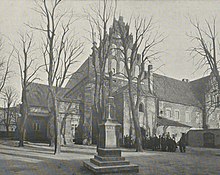| zespół klasztorny Bernardynów | |
 | |
 | |
| Monastery information | |
|---|---|
| Order | Cistercians |
| Established | 15th century |
| Architecture | |
| Style | Gothic |
| Site | |
| Location | Radom |
| Country | Poland |
| Historic Monument of Poland | |
| Designated | 2022-03-22 |
| Reference no. | Dz. U. z 2022 r. poz. 632 |
The Bernardine Monastery Complex (Polish: zespół klasztorny Bernardynów) is a Cistercian monastery in Radom, Poland. It is listed as a Historic Monument of Poland. Founded by King Casimir Jagiellon, the monastery has attracted the support of townspeople and nobility for centuries.
History

In 1467, after exchanges between King Casimir Jagiellon and Pope Paul II, Bishop Jan Rzeszowski was directed to establish a monastery. Monks came to Radom in 1468.
The position of the monastery originally sat next to Lublin Gate, a component of the Radom city walls. The king provided land, and other support came from a general collection.
In 1602, the chancel was demolished and reconstructed due to structural defects.
In January 1698, King Augustus II the Strong stayed at the monastery after his coronation.
After the 1815 Congress of Vienna, Radom fell to the Russian Empire. In 1863, the monastery was turned into a prison. In 1864, tsarist authorities closed all monasteries in Poland. This act was due to perceptions that the monks had participated in the January Uprising. However, while monasteries had been abolished, some monks around Poland were able to continue full-time or part-time roles. The Bernardine monks from Radom were deported to Paradyż.
By 1911, the Radom monastery was being used as barracks. Monks returned to the Radom monastery in the 1930s.
In 1942, during German occupation, two Radom monks were sent by a German court to Auschwitz concentration camp.
Architecture
The complex features the gothic church of St. Catherine of Alexandria and the neighboring monastery. The buttressed church has a single nave with two adjacent chapels. The chapel of St. Anne features a late-Renaissance gable. The chapel of St. Agnes features neo-gothic gables. The church and outbuildings form a small quadrangle.
See also
References
- Rozporządzenie Prezydenta Rzeczypospolitej Polskiej z dnia 15 marca 2022 r. w sprawie uznania za pomnik historii "Radom - zespół klasztorny Bernardynów", Dz. U., 2022, No. 632
- ^ "Radom - zespół klasztorny Bernardynów". Zabytek.
- ^ Janicka, A. (2010). Kościół i klasztor bernardynów w Radomiu od XV do XVIII w. Miejsce działalności społecznej i stały element krajobrazu miejskiego. Acta Universitatis Lodziensis. Folia Historica, 85, 7–20.
- ^ Prejs, R. (2021). Zanik obecności zakonników franciszkańskich w diecezji sandomierskiej po 1864 roku. Archiwa Biblioteki i Muzea Kościelne, 115(115), 337–358.
- The Encyclopaedia Britannica: A Dictionary of Arts, Sciences, Literature and General Information. (1911). United Kingdom: University Press.
- W nieustajacej trosce o polską diasporę: tom studiów historycznych i politologicznych dedykowany Księdzu Arcybiskupowi Szczepanowi Wesołowskiemu. (2012). Poland: Stowarzyszenie Naukowe "Polska w Świecie".
- ^ Luboński, J. (1907). Monografja historyczna miasta Radomia. Poland: Grodzicki.
51°24′05″N 21°08′51″E / 51.4014°N 21.1475°E / 51.4014; 21.1475
Categories:- Cistercian monasteries in Poland
- 15th-century religious buildings and structures in Europe
- 15th-century establishments in Poland
- Buildings and structures in Radom
- Religious buildings and structures in Masovian Voivodeship
- Christian monasteries established in the 1460s
- Gothic architecture in Poland
- Objects of cultural heritage in Poland